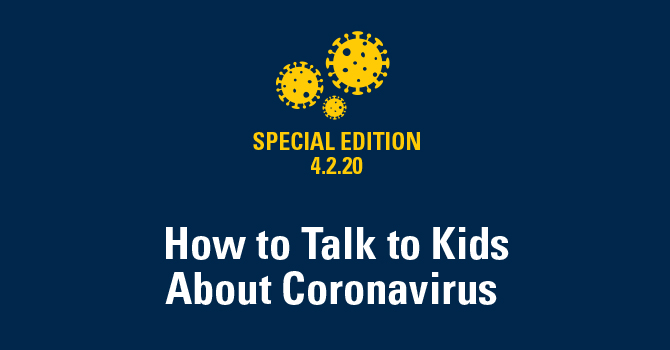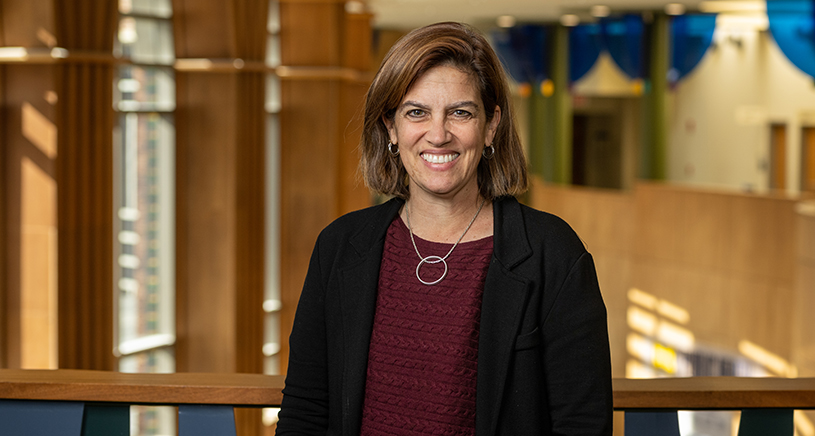How to Talk to Kids about Coronavirus

While many families are feeling additional stressors due to the spread of coronavirus, there are unique challenges to what kids are facing. How do we talk to kids about what is happening? Alison Miller from the University of Michigan School of Public Health explains how stress may manifest in children and some of the activities families can do to lessen the impact.
Listen to "How to Talk to Kids about Coronavirus 4.2.20" on Spreaker.
|
Subscribe and listen to Population Healthy on Apple Podcasts, Spotify, Google Podcasts, iHeartRadio, YouTube or wherever you listen to podcasts! Be sure to follow us at @umichsph on Twitter, Instagram, and Facebook so you can share your perspectives on the issues we discussed, learn more from Michigan Public Health experts, and share episodes of the podcast with your friends on social media. |
Speaker 1: The coronavirus pandemic has up-ended lives for families across the world. And here in the United States, schools and children's activities have shut down to promote physical distancing. This has created new dynamics and challenges for people raising children, and it also begs the question “How are kids navigating our new reality?”.
Hello and welcome to Population Healthy, a podcast from the University of Michigan School of Public Health. This episode is part of a series of special editions of our podcast, focusing on the ongoing coronavirus pandemic. Alison Miller is a developmental psychologist and an associate professor of Health Behavior and Health Education at the University of Michigan School of Public Health. While many are feeling additional stressors due to the spread of coronavirus, there are unique challenges to what kids are facing. Miller explains how stress may manifest in children, and some of the activities families can do to lessen the impact.
Miller: In terms of signs or symptoms for kids, I think one thing that's important to keep in mind is that they may not always be able to articulate their worries very well in words and so it can sometimes come out in their behavior. So for example, you might see some sleep problems. So kids waking up in the middle of the night when they used to sleep through the night, kids being fearful going to bed.
Some of these things when a child has achieved a developmental milestone and then they experience stress and go backwards. We call that regression. And so we might see regression in a few different areas. Like your child starts wetting the bed when they have not done that for a long time. And that might indicate some worry or distress on the part of the child.
Parents might also notice some more clinging behaviors like not wanting parents to go out of the house or to go to work or being with the parent that could be also a sign of stress or worry or anxiety in the child.
With kids, you always have to think about how much they also know already because we may think that kids aren't listening to us, but they often pick up more than we think they do. And so, certainly, in the case of even young children, they may pick up words that they may not know the meaning of, or that they may think they do know the meaning of and it's a scary meaning. So I think it's important to talk with kids directly. And one first thing to really focus on finding out is sort of, what do they know and what do they think, and what have they heard. So that you can ask and understand where they're coming from before giving them a lot of additional information - which is hard to do sometimes. Because we wanna talk and make it better for them, but sometimes it's important to sit down and listen first.
Another thing to just be mindful of is that the ways that we manage our own anxiety really can translate to our kids or the kids that we're interacting with. And so, just being conscious of perhaps limiting one's news diet and not always talking about COVID-19. This is probably a good idea anyway for all of us, but how we manage our own anxiety and worries can set the stage for how kids are gonna be able to manage their own. There are some other things that are important, especially with older kids who may understand more about what's going on. So for example, teenagers I think it's important to normalize that it is an anxiety-producing situation and that some of those feelings are quite normal.
Spreaker 1: Many children around the United States are now adjusting to life without the structure of attending school each day, engaging with our social network in person, or participating in other activities outside of the home. They may be feeling a loss with all of the sudden change.
Miller: Another few things we could think about doing with kids, is to engage them in planning for new routines and new activities and maybe sort of shift the focus from worrying about COVID-19 to what are some things that we can do and what new things are we going to be doing now. And so, things like engaging your kids in figuring out new routines around the home can be really important and really empowering for kids to give back a sense of control that might be kind of lacking when they're feeling uncertain and anxious. So engaging your kids and planning out new routines could be a really helpful thing to do.
Another way to sort of shift that focus is to engage kids in ways that they can help. Either bringing things to neighbors who can't maybe go out and get them for themselves or doing a favor for someone, writing a nice letter to a grandparent. Things like that might be really nice to do to help the kids shift the focus from worry to doing something positive.
It's also just important for all of us, I think, to engage in some helpful distraction activities. Like take a break from trying to get your work done and take a walk or try something new, maybe learn how to cook a new dish. Take the time to do that.
One of the things I have noticed among colleagues and individuals who work with the schools is that the schools have been doing a really great job helping to ensure that the kids who are not necessarily able to access the food resources they need at home, so they might be food insecure, the schools and food distribution organizations are working together to ensure that kids and families are getting the nutrition that they need. Which is incredibly important at this time, at all times, but certainly at this time because not all kids have equal access to healthy, safe environments, healthy food, or healthy opportunities for physical activity and exercise. The kids and families who are in these higher risk groups and low income families, may be a particular risk because they're not in school and they're not being connected or seen by teachers, and so there's more opportunities when families are all cooped up together and also under stress, and they don't have their regular outlets to relieve stress. Parents could be at great risk for stress, and then kids can also be a greater risk for maltreatment. Some of my colleagues in the law school, and other places are thinking about that in terms of how do we best protect kids when some of our methods of protecting kids are a little hampered by the social distancing.
Speaker 1: This has been a special edition of Population Healthy, a podcast from the University of Michigan School of Public Health. During the ongoing coronavirus pandemic, we’ll work to bring you analysis from our community of experts to help you understand what this public health crisis means for you. To stay up-to-date in between special edition episodes, be sure to check out our website publichealth.umich.edu, subscribe to our Population Healthy newsletter at publichealth.umich.edu/news/newsletter and follow us on Twitter, Instagram, and Facebook @umichsph.
In This Episode
 Alison Miller
Alison Miller
Associate Professor of Health Behavior and Health Education
Alison Miller is a developmental psychologist who studies risk and resilience in children and families. She studies basic developmental processes, including self-regulation of emotions, sleep, eating behavior, and neuroendocrine stress responses in young children. Learn more.
